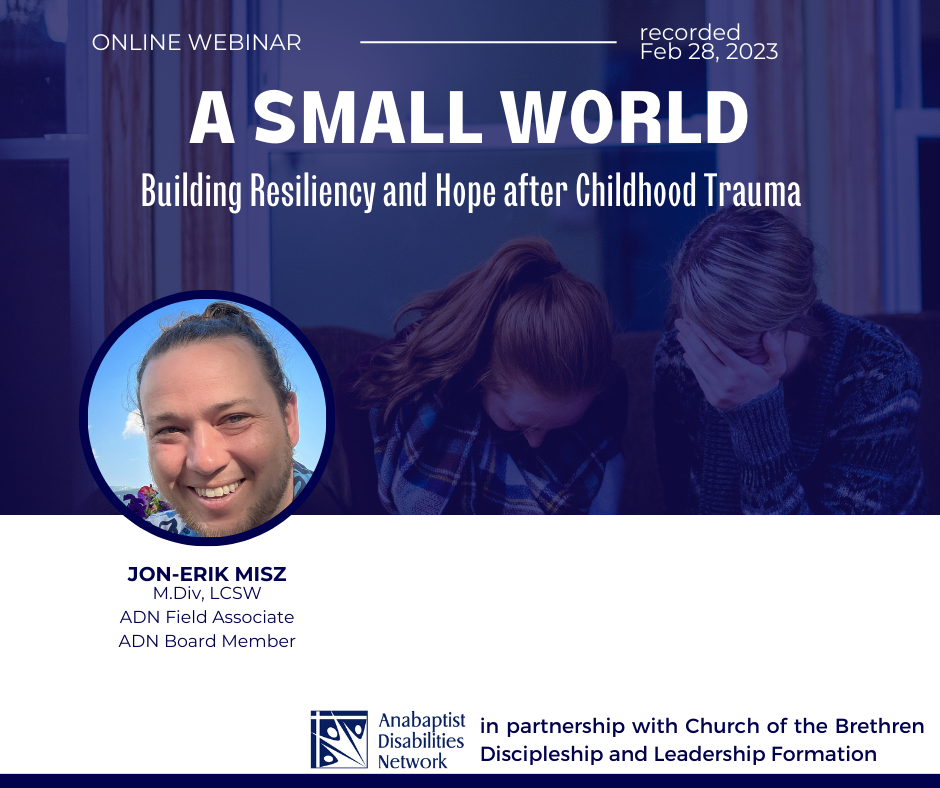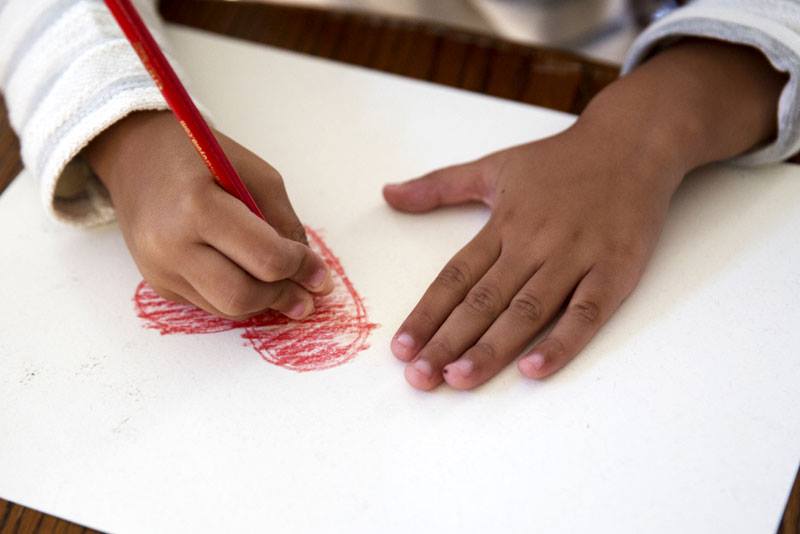Trauma and PTSD
Post-Traumatic Stress Disorder (PTSD) can develop after exposure to a traumatic event in which harm occurred, was threatened, or was witnessed. Traumatic events include abuse, assaults, natural or human-caused disasters, accidents, adverse childhood experiences (ACEs), or military combat. The development of PTSD is not necessarily related to the severity of the trauma. Disabled people have an increased incidence of trauma and PTSD.
Congregations can accommodate people with PTSD by creating trauma-sensitive environments and providing trauma-informed care.
Resources
-

A Small World
ADN field associate and board member Jon-Erik Misz, MDiv, LCSW, speaks on trauma, resiliency, and hope for children who experienced difficult times.
Resources from Others
- Strategies for Trauma Awareness and Resilience (STAR). STAR trauma healing workshops have trained thousands of caregivers and leaders worldwide to promote healing, revitalize their communities, and stop cycles of victimhood and violence. STAR teaches strategies for handling post-traumatic stress and leading others beyond traumatic events, informed by the latest trauma healing research from the fields of neurobiology, psychology, restorative justice, conflict transformation, peacebuilding, and religion/spirituality. The curriculum is developed by faculty and training staff of the Center for Justice and Peacebuilding at Eastern Mennonite University.
- Trauma-Informed Congregations and Worship: Being Made Whole. A resource from the Calvin Institute of Christian Worship.
- Chicagoland Trauma-Informed Congregations Network. An interfaith table that brings together faith-rooted organizations and others that are interested in using our collective wisdom to respond to the call to facilitate and deepen the role of faith communities in recognizing and creating “safe and brave spaces” that support the healing of trauma experienced by individuals and communities.
- North Carolina Council of Churches Sacred Series Toolkit: Becoming a Trauma-Informed Faith Community. A toolkit that offers congregations an overview of helpful strategies in becoming a trauma-informed faith community.
- Into Account. Support for survivors of sexual violence and allies seeking justice, accountability, & recovery in Christian contexts. Into Account consults with communities of faith, educators, and a broad variety of institutions on strengthening their readiness to prevent and resist sexual violence, respond with ethical integrity to survivors’ reports, hold those responsible transformatively accountable, empower and enact solidarity with survivors, and create a culture of lasting change.
Recommended Reading
- The Little Book of Trauma Healing: When Violence Strikes and Community is Threatened by Carolyn Yoder. “The primary premise and challenge of this Little Book is that traumatic events and times have the potential to awaken the human spirit, and, indeed, the global family. But this requires acknowledging our own history and that of the enemy, honestly searching for root causes, and shifting our emphasis from national security to human security.”
- Does My Child Have PTSD? What to Do When Your Child is Hurting from the Inside Out by Jolene Philo. With years of research and personal experience, Philo provides critical information to help people understand causes, symptoms, prevention, and effective diagnosis, treatment, and care for any child struggling with PTSD.
- Aftermath: Violence and the Remaking of a Self by Susan J. Brison
- Trauma and Recovery: the Aftermath of Violence–from Domestic Abuse to Political Terror by Judith Herman
- The Body Keeps the Score: Brain, Mind, and Body in the Healing of Trauma by Bessel van der Kolk
- Trauma Stewardship: An Everyday Guide to Caring for Self While Caring for Others by Laura van Dernoot Lipsky
- My Grandmother’s Hands: Racialized Trauma and the Pathways to Mending our Hearts and Bodies by Resmaa Menakem
- 8 Keys to Safe Trauma Recovery: Take-Charge Strategies to Empower Your Healing by Babette Rothschild
Trauma & Theology
- Trauma + Grace: Theology in a Ruptured World by Serene Jones. A collection of essays about how individual and collective violence affect one’s capacity to remember, to act, and to love; how violence can challenge theological understandings of grace; and even how the traumatic experience of Jesus’ death is remembered. At the heart of each essay are two faith claims: (1) we live in a world profoundly broken by violence, and (2) God loves this world and desires that suffering be met with words of hope, love and grace.
- Trauma Sensitive Theology: Thinking Theologically in the Era of Trauma by Jennifer Baldwin. The intention of this book is to help theologians, professors, clergy, spiritual caregivers and therapists speak well of God and faith without further wounding survivors of trauma.
- God and the Victim: Theological Reflections on Evil, Victimization, Justice, and Forgiveness by Lisa Barnes Lampman
- Spirit and Trauma: A Theology of Remaining and Resurrecting Wounds: Living in the Aftermath of Trauma by Shelly Rambo
Trauma & Scripture
- Resurrecting Wounds: Living in the Aftermath of Trauma by Shelly Rambo. Rambo rereads the Thomas story and the history of interpretation through the lens of trauma studies to reflect on the ways that the wounds of race, gender, and war persist. By returning again and again to Christ’s woundedness, we discover ways to live with our own.
- Bible through the Lens of Trauma edited by Elizabeth Boase and Christopher G. Frechette
- Jeremiah: Pain and Promise by Kathleen M. O’Connor
Trauma & Pastoral Care
- The Cry of Tamar: Violence Against Women and the Church’s Response by Pamela Cooper-White
- Sacred Wounds: A Path to Healing from Spiritual Trauma by Theresa B. Pasquale
- Glimpsing Resurrection: Cancer, Trauma, and Ministry by Deanna Thompson
Recommended Videos:
- Out of the Ashes: Transforming Trauma. A southern California community experiences healing after wildfire destroys many homes. A 4-minute YouTube video produced by Pathways to Promise.





